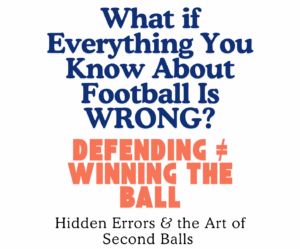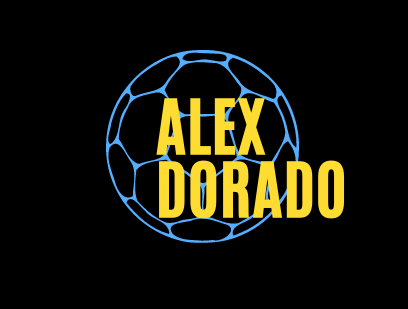
Defending ≠ Winning the Ball: Hidden Errors & the Art of Second Balls
Over the past few days, I’ve seen several behaviors in different matches that I’d like to comment on. In many cases, these are thoughts or ideas that have been on my mind for a while and have resurfaced recently.
Before I begin, I should say, it’s hard for me to watch a game like a fan. It’s difficult to disconnect from thinking about what I would do, what I would change, or what I would say in the match I’m watching. I sometimes try to switch into fan mode and just enjoy the match, but I’ll warn you: I never manage it.
When I analyze a match, I try to do it from a collective perspective, based on what I would want to see.
Our past, our preferences, our experiences… they shape how we reflect on and criticize matches. But that doesn’t necessarily align with the reality of the team. Only the coach knows their team’s real situation, what they can and can’t do, what they asked of their players, what they prepared for…
With that in mind, I don’t agree with the post-game analyses from coaches or journalists who break down what the coach should have done to win. There is a much deeper process within a coaching staff that must be respected. From the outside, we should analyze what was done and what the consequences were, not guided by the result.
I’ve said it before in previous texts:
The same decision can make someone look like a genius or a bad coach, depending entirely on the outcome of a match.
Reuniting with Two Great Players, and Even Better People
This past Sunday, I went to watch a match featuring two players I coached at Real Madrid: Néstor and Pipi. They currently play for Racing de Santander’s B team, and both are part of the 2003 generation.
I had the good fortune to work with them over two seasons (2013/2014 and 2016/2017).
As any coach who’s spent real time with a team knows, I can describe and predict their behavior in nearly every situation on the field, and often off it, too. Back then, they formed the midfield core of Real Madrid alongside Pablo Barrios.
To give you some context: In the 67th minute, the referee sent off a Racing player. Then in the 84th, Coruxo took the lead.
As is common in teams down a man and behind on the scoreboard, Racing Cantabria still managed to create some attacking chances. These came from set pieces, long free kicks that became goal-scoring opportunities.
In the 89th minute, Racing suffered a second red card. Even with two players down, they managed to push forward and get into the opponent’s half.
I was seated in the front row, near the corner closest to the goal Coruxo was defending. Less than a minute after the second sending-off, a Racing player received the ball just a meter from where I was sitting. He was surrounded by two Coruxo players. A third came sprinting over and, without a second thought, went for the ball.
Fault.
In the last minute of the match, Racing Cantabria earned a dangerous free kick, only because one experienced Coruxo player tried to win back an unnecessary ball and committed a foul.
That mistake could have been very costly for a team fighting to stay in the league. But these types of mistakes happen all the time, players attempting to win back the ball when they really shouldn’t.
Defending Is Not Recovering the Ball
To defend means to protect (someone or something) from harm or danger. Defending does not mean recovering the ball. Defending means protecting our goal from the opponent scoring.
A defender, meaning any player whose team doesn’t have the ball, needs to understand that their role is to protect, not to recover.
I believe we, as coaches, should help players understand when we are in recovery mode and when we are in protection mode. They need to know which moments and which areas are the right ones to press actively and when to stay passive. And ideally, we should define those moments and zones clearly with them.
In this specific case, it was neither the moment nor the area to try to recover the ball: not based on the game situation (near their own box), not based on the match context (winning by one goal, with two extra players, in the final minute).
A Great Match
I think everyone, or nearly everyone, who watched Tuesday’s Champions League match between Arsenal and PSG would agree: Luis Enrique outplayed Arteta.
It felt like a game of chess, Luis Enrique pushed his central pieces forward and dominated the board.
But I’m not here to talk tactics. Instead, I want to focus on a specific individual behavior that repeated throughout the match.
When PSG played long balls and players went up for the aerial challenge, PSG’s players would pause for a split second before the duel and instead look to win the second ball.
I don’t know if this was a clear instruction from Luis Enrique and his staff or just something that happened naturally,
but it’s something I’ve been reflecting on for a while:
The important thing isn’t the duel.
The important thing is winning the second ball.
⚽ Want more honest coaching reflections rooted in the reality of the game?
📲 Follow us on Instagram @alexdoradoteam for practical insights, in-game behaviors, and football thinking beyond results.
📚 Read more articles and rethink what it really means to defend, compete, and grow.
